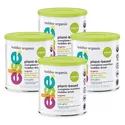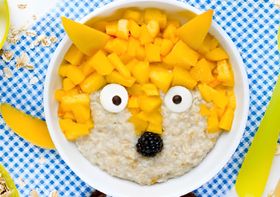Milk & Dairy Alternatives for Babies and Toddlers
Looking for milk and dairy alternatives for your little one? Explore a wide range of nutritious options that are gentle on their tummies.
Published May 5, 2024

During the first stage of life, babies can get everything they need from their mother’s breast milk. But what happens if they aren’t breastfed anymore?
When babies wean off of infant formula, cow’s milk is often the first beverage we reach for to replace breast milk and deliver the necessary protein, fat, and vitamins to our children. These nutrients are essential for childrens’ growth and development; they promise strong bones, brains, and muscles.
Considering Reasons for Dairy-Free Options
There are many reasons, both personal and medical, that require a milk alternative for toddlers and babies. While some children may have a milk protein allergy or are intolerant of it, this isn’t the only reason parents choose something else. Many parents want sustainably sourced, plant-based products for their children because of ethical and dietary motivations.
Whatever the reason, if you’re looking for a dairy-free formula for your toddler or baby that delivers the same great nutrition, there are options for you.
As parents, we want what’s best for our children, but what’s best for one child isn’t always best for another.
Many children may experience an allergy to cow’s milk protein, or are intolerant of the naturally occurring sugar in cow’s milk, lactose. For these kids, cow’s milk protein can not only be uncomfortable, but even dangerous. If you have discovered a dairy intolerance in your child, it’s important for both their health and comfort to look beyond the dairy milk carton. Don't give your child something that makes them feel unwell, there are many alternatives that are easy to access.
Here are a few milk alternatives for toddlers with allergies or plant-based diets.
An important disclaimer: These dairy-free milks are not replacements for breast milk or baby formula, but can be used as supplements to your child’s diet in place of cow’s milk.
Milk and Dairy Alternatives for Babies and Toddlers
🍼Soy Milk
Soy milk is made from soybeans and is an alternative milk that has a fairly similar nutrient composition to cow’s milk. However, it’s important to choose a fortified and organic version to ensure your child is getting all the nutrients he or she needs and protect them from genetically modified ingredients.
Some children who have a milk allergy could also have an allergy to soy. If you’re seeking an alternative because of a dairy allergy, it’s probably safest to select from one of the other dairy-free alternatives.
🥜Nut Milk
You’ve probably noticed a plethora of nut milks on the grocery store shelves; there’s almond, cashew, macadamia, coconut, and so on. While nut milk is a great milk option for full grown adults, they are much lower in fat, calories, protein and carbohydrates and thus, are found lacking when it comes to providing proper nutrition for your toddler. If you do opt for nut milk, reach for unsweetened versions to avoid excess sugar often added to these products.
🌱Seed Milk
Seed based milk alternatives are typically made from hemp, flax, or sesame seeds. While hemp milk and other seed-based milk is high in fat and fiber, they fall short when it comes to carbohydrates, protein and overall calories.
🫛Pea Milk
Pea-based milk is made primarily from peas and tends to have a similar high protein content to whole cow’s milk. However, pea milk has less fat, carbohydrates and total calories than cow’s milk. You could consider supplementing pea milk with a seed milk as well to give your toddler more healthy fats.
🌾Grain Milk
Grain based milk alternatives are available as well such as oat milk and rice milk. These milks provide little nutritional value. They lack calories, protein, and fat compared to cow’s milk.
Rice milk may be a good source of calcium and a variety of other micronutrients, but it also can have traces of the heavy metal, arsenic, which can cause a number of problems later in life.
The Challenges with Alternative Milk
While you can obtain some nutrients and vitamins from these milk alternatives, none of them are a complete replacement for cow’s milk or should be relied on for adequate total nutrition. If you’re aware of the challenges with these alternatives, you’ll be better able to supplement your child’s diet.
Lack Necessary Nutrients
Simply picking up a carton of oat milk, soy milk, or almond milk from your local grocer may not cause any harm, but won’t provide the most benefits either. While you can find “milk” from soy, nuts, grains, hemp, and peas, these milk alternatives typically don’t contain the same amount of calcium or vitamin D as cow’s milk, let alone both, unless these nutrients are added during the manufacturing process.
Cow’s milk can also be a great source of protein, fat, and calories, essential for muscle and brain development in children. While some dairy-free alternatives for toddlers meet the necessary fat or protein levels for development, you’ll be hard pressed to find a formula that provides all the same benefits as cow’s milk.
Contain a Lot of Sugar
Many plant-based dairy alternatives can also be loaded with added sugar. Sugar is not just non-essential to a child’s diet but may be detrimental. Research suggests that introducing added sugar to children early on can have adverse effects later in life, leading to poor eating habits and even chronic disease.
Lacking Whole Foods
Your average milk alternative for toddlers can be diluted with added preservatives and stabilizers as well. By the end of the production process, they may contain little of the actual natural ingredients they are made of. , Some of these products may be so processed they are far from being considered a whole food.
A Nutritionally Rich Choice: Else
So what do you do if most of the milk alternatives on the market don’t meet the needs of your child? There is a better quality milk alternative for toddlers available.
Else is different from most cow’s milk alternatives. It is made with 3 main ingredients— almonds, buckwheat, and tapioca—without any preservatives or stabilizers. This dairy-free nutrition drink contains no casein, whey, or lactose so it’s safe for toddlers with a dairy allergy or lactose intolerance. Plus, it is made with whole foods that provide the protein, fat, fiber and vitamins and minerals that meet all the nutritional needs of your growing toddler.
Previously, parents who were looking for an allergy-friendly, plant-based, vegan, and ethical option that is actually nutritionally sufficient to replace cow’s milk came up empty. But now, there is something Else. With Else, there is now a readily available, dairy-free, soy-free, non-GMO, nutritionally dense, low-in-sugar alternative to cow’s milk, that’s tasty too.
Else Plant-Based Complete Nutrition is the ideal milk alternative for 1 year old toddlers and older. While there are many dairy-free alternatives for toddlers available, there are not many that offer the calories, fat, calcium, vitamin D, and protein found in milk, plus a host of other nutrients and vitamins not found in cow’s milk. It mimics the nutritional gold standard composition values of breast milk, and is pediatrician endorsed. That’s Else.









